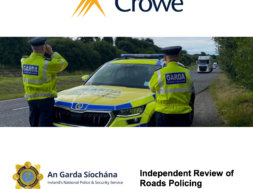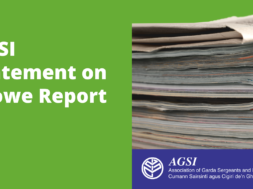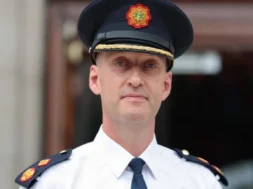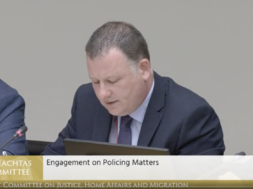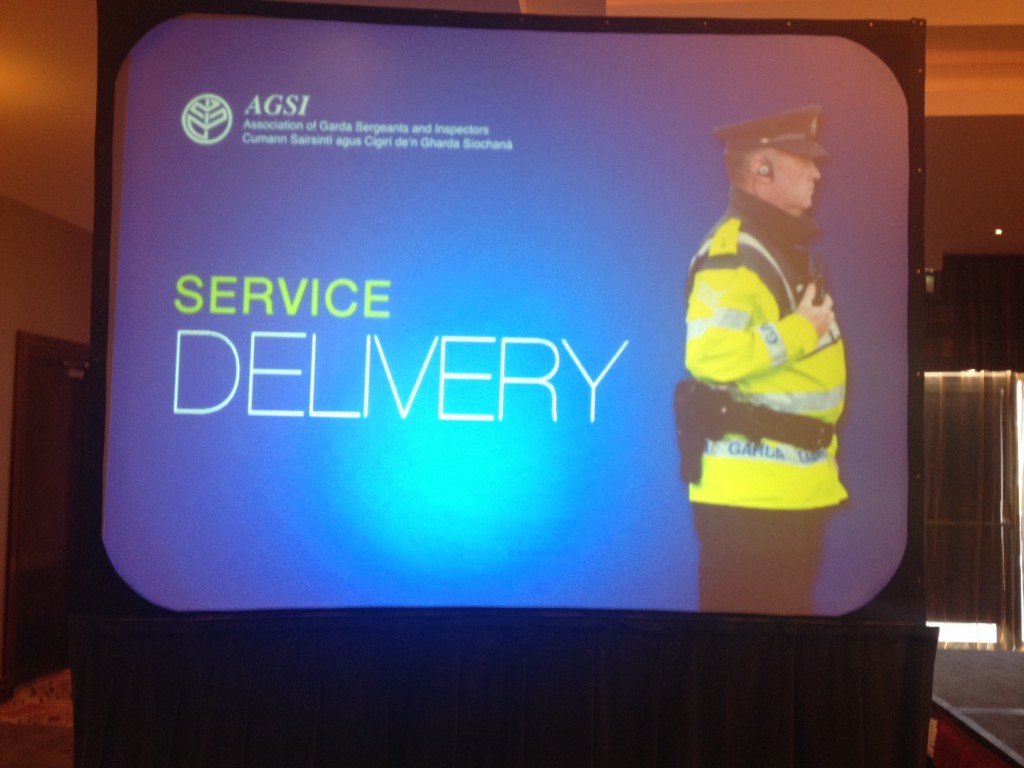Vice-President Larry Brady delivered the President’s speech on behalf of President Tim Galvin who was unable to attend conference.
Please find below the full text of the President’s Address at the 35th Annual Delegate Conference:
Minister for Justice, Equality and Defence, Mr Alan Shatter T.D., distinguished guests, fraternal delegates, fellow delegates, friends and colleagues.
Good evening to you all and welcome to the Clarion Hotel, Sligo.
Pay Talks and Labour Relations Commission Proposal
In June 2010 this Association signed up to the Croke Park Agreement 2010 – 2014. We have spent the last three years implementing the sectorial agreement as far as the Garda Síochána was concerned. We have implemented new rosters; completely changing the family lives of our members, and putting increased strain on people’s circumstances. We have had a pilot in place for nearly a year now. We have been involved in the introduction of civilianisation across some aspects of our work and we have piloted and developed a Performance Management System. This Association has always been upfront and we have integrated ourselves into what was required. However, our Senior Management have displayed quite the opposite. They have not consulted, and they have been cited on a number of occasions to Mr PJ Fitzpatrick, the Chairman of the Garda Implementation Body and also the chair in respect of An Garda Siochana. We have seen huge changes in our work practices and our conditions of employment. All of this involvement was with the guarantee that our pay would not be cut again during the agreement. This agreement was to run until the 1st June 2014. At the beginning of Croke Park we rolled over and got our tummies tickled for the benefit of our country. We all could see the difficulties our country was in and the financial problems caused by the select few within our society.
Members of this Association took a 14% pay cut as well as the introduction of Pension levy’s, income levy, Universal Social Charge and changes to PRSI without much grumbling because we felt that it was important for this wonderful country we all live in. This has meant an average 20% reduction in our wage packet.
In September we were informed that Government wanted to save another 1billion euro from the pay of public servants and we attended a number of briefing sessions where we were told nothing. On January 23rd 2013 we informed the Labour Relations Commission that we would not come again unless some proposals were put to us, and the following day our Senior Management produced a two-page document. Their negotiation was to tell us to “choose a number of allowances to eliminate” in order to make savings. But this is pay we get for working 24/7. We were also told that we would have to work extra hours for no pay. The total savings required from Garda members was 60 million euro over the three years.
We as an Executive met on the 25th January and decided that we could not countenance any more cuts to our wages. We decided not to return to Lansdowne House and sit waiting while others decided our future. We have no negotiation rights. Despite some media commentary to the contrary, this fact remains. We cannot negotiate any pay elements for ourselves. We are excluded from any talks and we pick up the crumbs off the top table.
For myself, Minister, and a lot of my colleagues on the floor today and working in Stations around the country – this is not about Ireland PLC or An Garda Síochána, this is about survival, survival for themselves and their families. Enough is Enough. I stand here today prepared to fight any more cuts to my pay packet and those of my colleagues. We are different to other members of the public service. This was proven recently with the recent implicit threat by Garda Management to prosecute our General Secretary John Redmond and to charge him with a criminal offence for defending the pay of our members. This threat has only copper-fastened the resolve of the people here today. Macushla was a little over fifty years ago where members of An Garda Síochána stood up to the conditions they were being forced to work in. In 1961 members of An Garda Síochána were sacked for believing that they were human beings and entitled to a fair days pay, for a fair days work. We are at that crossroads. You and your Government colleagues have decided that I and my colleagues must pay for other people’s wrong-doing, and your failure as a member of the Oireachtas to ensure proper regulation of our banking systems. “While employees and the community are left to the protection of the invisible hand, wealth is protected by the visible hand of government and corporations.” (Marjorie Kelly)
The Labour Relations Commission Proposals mean a triple hit for members of An Garda Siochana. It will include cuts in our pay, subsequent cuts in our allowances and pension-related cuts. The key points from the proposal which need to be highlighted for all public servants are:
Clause 1.14
“Government agrees that in the event that the commitment or assumptions reaffirmed under this agreement must be revisited, the Parties will meet to discuss the circumstances and the implication for the agreement.”
This is nothing less than a get out of jail free card for you and your Government.
Clause 2.29
“There will be full co-operation by the parties with the follow up to the Government’s review taking into account the recommendations in relation to Labour Court Recommendation 20448.”
This gives government carte blanch to go after all allowances in the nature of pay. It allows a one and a half times buy out.
Clause 2.30
“Full agreement by parties to review all subsistence and travel and introduce a standard rate across the public service.”
Any group that would agree to this is selling their people out.
This is the Ireland we live in today. The middle and working class people bail the rich out of the mess they made of our country. These people take no responsibility and walk around protected by the few. They have vast pensions from many sources all provided by Government and they are the untouchables of our modern Irish society.
So Minister, the point is, that the Association of Garda Sergeants and Inspectors were never in talks. We sat at a table outside while officials from the Labour Relations Commission fed us the crumbs from the big table.
Station Closures
Minister a delegation from this Association met you on the 29th March 2012 so that you could tick the box that you had met us before last year’s Conference. You told us that the lack of consultation in relation to the first series of closures would not be repeated and that we would be updated and kept informed.
12 months on and nothing has changed. Your words were lies. 100 stations were earmarked since then and despite numerous requests to Garda Management and you Minister, we find out what stations are closing on the Garda Portal system while you stand in the Dáil making the announcement. Worse than that is the fact the President and General Secretary are called to a meeting to be updated on the plans and while there, the information is available on Twitter. I believe members of An Garda Síochána are entitled to know where they are going to be working. They should be entitled to be informed of what is going on and be consulted. Station closure does not just mean a new Station, it also could mean the possibility of extra expense with travel. It could mean a change in family routine such as school runs or child-minding arrangements. The closure of stations has destroyed the bedrock of this organisation, that is, the ability of people to live and work in their communities. The effect of station closures on the service delivery that we have constantly spoken of, is an unknown. The local Garda was a vital link between the organisation and the public we serve. This link has now been withdrawn to the local District or Divisional Headquarters and as we have seen since the closures last year they are not replaced. The solution to this withdrawal is to buy five Fiat Ducata Vans to fill the void. What do we do going forward? Draw lots to see who can have a van this week? What little resources we do have are being pulled away to fill requirements in other areas of policing and we are forced to use sticky plasters to hide the cracks. In my own District the closure of Dalkey resulted in the loss of 61,000 man hours per year despite the promise that service would not be affected. Most of the members were transferred to Dundrum and Stepaside so that the commitment to have a Garda on duty at your home, Minister, could be fulfilled along with the other static posts in the Blackrock District. In the intervening period, Stepaside Garda Station has also been closed.
In the rural areas of the country the members working in the area where stations have been closed were a vital cog in the intelligence wheel of the Gardai. We are different than any other Police force in Europe. We live and work within the communities we serve and this link is now going to be destroyed and we believe that the consequences will not be seen for a number of years.
We have a service to provide to the public, how we can provide that service if we do not know from where we will be working on any given day.
Assaults
At that meeting we also discussed the issue of assaults on members of An Garda Síochána while on duty. We should also include other emergency workers who work 24/7 on the frontline in our fire station’s, ambulance crews, nurses, and prison officers. There seems to be carte blanch acceptance that we can be assaulted as there is no deterrent. Since we spoke to you we have had our colleague Adrian Donohue shot dead, a number of colleagues shot at, a young garda in Tallaght slashed in the face and another member in Store Street beaten and the private car of a member torched in the car park of a station in Clare. It is the nature of the role we perform that there will be confrontation. We spoke to you about Section 19(1) of the Criminal Justice Act 1984 and the fact that offenders are being charged with an offence under Section 2 Non-Fatal Offences against the Person Act 1997 and being dealt with summarily in the District Court or worse still by adult caution. Injured Gardai are being recorded as witnesses to these incidents and no proper record is being kept of the numbers being injured. You Minister undertook to address this particular issue with the office of the Director of Public Prosecutions but a year on we have heard nothing. Do you Minister really care about your employees? Or is it lip service?
Morale
Despite your best efforts Minister, to spin that morale is fine, I can tell you that morale in this organisation is at an all-time low. We are being caught from all sides. Members are angry and deeply resentful of you and your Government and your apparent lack of appreciation for them and for the fine work they do. We constantly read articles where you criticise us for fighting to preserve our pay and allowances. Allowances which are small compensation for working unsocial hours, and defending the rights of society, against law breaking of all sorts whether that is public disorder or gangland drug dealing and murder.
Morale is low because Sergeants and Inspectors recognise that we have no voice in defending our pay and conditions at central negotiations. Morale is low because of the shortage of resources to allow us perform our job effectively, not least the availability of a proper and adequate fleet to respond to the demands of the public and meet criminals on a level playing field. Morale is low because of the absence of meaningful involvement in decision making, station closures being the most evident example. Morale is low because of the increasing demands being placed on the shoulders of those who remain within the organisation, as our colleagues depart and are not replaced and no sign of replacements. Morale is low because career advancement is stifled. The numbers being promoted is at an all-time low. In 2008 14% of those members who presented for promotion from Sergeant to Inspector were promoted, while in 2012 just short of 8% of those who presented for promotion were promoted from Sergeant to Inspector. Morale is low because the opportunity to move to a Station closer to home and reduce the commute time and costs are limited due to internal policy and the shortage of sufficient Supervisors at Station level to allow their release. But Minister the biggest impact on morale is lack of acknowledgement by you Minister, and Senior Management that a reduction in our allowances is unjust. Unjust because these allowances are not drawn under false pretences. We work nights and weekends and these allowances are, in our view being unjustly targeted just because we earn them. The stress being placed on people is immense. We as supervisors are being drowned in paper. Duplication on a massive scale. We as an Association carried out our stress survey for Conference last year. The result was people informing us that the biggest stressor in their day-to-day job is being overwhelmed with the bureaucracy that this organisation generates.
Inspectorate report on frontline supervision
The Inspectorate report released on the 12th March this year highlighted the issue of a lack of supervision for the members working on the frontline. As a frontline supervisor in a District Headquarter Station in the city, I can see the problems it is creating daily. The Association of Garda Sergeants and Inspectors has been highlighting this for a number of years. On my unit in a busy suburban District in Dublin there are some dates where there is only one Sergeant supervising over 30 on the ground across four stations. This is unsustainable, and will result in some young members making the wrong decisions and ending up getting themselves involved in complaints to An Garda Síochána Ombudsman Commission, complaints from An Commissioner Teanga and internal discipline. The review of frontline supervision was carried out when the frontline was policed using the old four unit roster. This has changed under the provisions of Croke Park. We now work a five unit roster. Each working unit now has less supervision to correspond to the roster change. The Inspectorate recommendations are unachievable in the current economic situation we find ourselves. There is no money for any training to be carried out and what little there is, is being used to hold training courses for Reserves, not the people on the frontline who require and should receive constant updating of the legislation required to carry out their function. The absence of appropriate supervision and training exposes An Garda Síochána to a significant corporate risk; claims for compensation where Garda powers are not exercised correctly. Amazingly when Gardaí exercise their powers incorrectly because they were not properly supervised the State will compensate the injured party for the organisations’ wrong-doing, and rightly so. However, invsesting in proper training and better supervision would reduce exposure to claims from the public and ultimately save the state money. I call on you Minister to instruct the Garda Commissioner to identify the appropriate level of supervision required to safeguard your employees and the public and put a process in place to fund the identified training and supervisory needs.
The Labour Relations Commission proposal will mean less supervisors, not more, as people are looking closely at their options. A large proportion of the people that can retire are frontline supervisors at Sergeant and Inspector rank.
Promotions/ Recruitment
Minister you must consult with Garda Management to develop and implement a strategy for promotion and recruitment. Succession planning is not a new concept, we need to think how we will replace members of Sergeant and Inspector rank who have a important supervisory function. We also need to ensure that there is a plan in place to replace retiring members with new blood who are full-time employed and not just recruiting reservists in a hope to hoodwink the public by parading uniforms on the street who have limited powers and in some cases limited interest. An Garda Síochána, our National Police Service must be properly resourced with rank and file Gardaí who are fully trained, with full police powers and properly supervised and managed in the operational area in order to maintain public confidence. It is this confidence that has over the years resulted in public satisfaction levels unachievable by other police forces.
Currently we have two promotions’ lists sitting on your desk and the desk of Minister Howlin in the Department of Public Expenditure and Reform. There are 34 Sergeants on a list for promotion to Inspector and 82 Gardaí for promotion to the rank of Sergeant. I call on you now Minister to tell us during your address here this evening when promotions on these lists will, not just start but will be finalised. Commit tonight Minister to these Sergeants and Inspectors in waiting, that all be in place within one month. Give the Garda organisation some support. In so doing you will reassure the public that you have their interest at heart by providing proper supervision for operational Gardaí working within their communities. This would help alleviate a fraction of the supervisory problems we are having. I am also calling on you to stop the reduction in numbers within the Gadra organisation and commit here to commencing a recruitment campaign in the immediate future. Even recruiting members tomorrow would not see them on the beat for perhaps 9 months allowing for the recruitment and training process. Do you want to see the organisation on its knees before you commence a recruitment campaign? My colleagues here tonight do not. On top of this we are crying out for some form of recruitment campaign and a lifting on the moratorium. An Garda Síochana as an organisation needs new blood to help maintain the service we provide to society. Like any organisation a regular in-flow of new blood adds great value to the overall service provision. I informed the delegates that I did not expect any recruits on our streets before 2016 or 2017. My prediction is coming through I am sad to say. I hope you Minister will look favourably on starting some sort of recruitment campaign as resources are stretched and the elastic that keeps them in place is about to break.
Sex Offenders Act 2001
Minister on the 29/3 2012 we asked you to explore the possibility to require offenders subject to the Sex Offenders Act 2001 to complete the notification form in person at the District Headquarters Station where he/she intends to reside not at any District/ Divisional Garda Station within the state as current legislation requires. We also asked that some system be put in place to monitor the risk level of such offenders. You informed us that you intended to introduce new legislation before the end of the year. Where is this legislation and what plans are in place to introduce the new law?
Minister, I have asked you a number of questions that this Association would like answered. I believe you and the Government are being disingenuous to the hard working men and women of this Association who go into work every day on behalf of this State not knowing what they face and with regret some have not made it home.
Finally a quote from John F Kennedy – “And when at some future date the high court of history sits in judgment on each of us, recording whether in our brief span of service we fulfilled our responsibilities to the state, our success or failure, in whatever office we hold, will be measured by the answers to four questions: First, were we truly men of courage? Second, were we truly men of judgment? Third, were we truly men of integrity? Finally, were we truly men of dedication?”
I can assure you Minister the members of AGSI are not lacking in these characteristics. Convince us Minister, that you too have these characteristics. Publicly defend the pay and conditions of your employees within the Garda organisation against opposition from others in Government. Stand up and be counted like the members of An Garda Síochána have done for many years as they defended this State and protected civil society and as they will continue to do for many years to come with your support.
Thank You.



